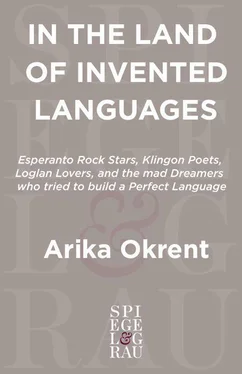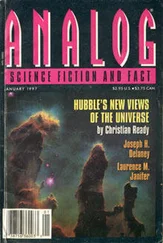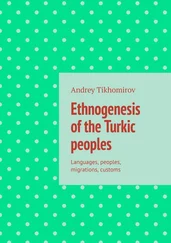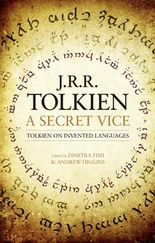Part of what allows him to deal with accidental inconsistencies in such a natural way is that a realistic amount of wiggle room was built into the language from the beginning. In the introduction to the first edition of his dictionary, he discusses some “dialect differences” in Klingon vocabulary and pronunciation. (The notion of dialect difference has been important, he told me, “considering the difficulty in getting the actors on the show to say things right.”) He also allows for exceptions to the grammatical rules. For example, as stated in the chapter on nouns, the plural suffix - mey “cannot be used with body parts. It should be noted, however, that Klingon poets often violate this grammatical rule in order to evoke particular moods in their poetry. Thus, forms such as tlhonmey nostrils scattered all about do occur.” The language is just messy enough to be credible, and this messiness, built into the design from the very beginning, sets Klingon apart in the history of language invention. Klingon has no bone to pick with natural language; it is rather a respectful homage to the strange and interesting things that languages can do.
Another quality that makes Klingon stand out from the vast graveyard (for the most part) of previous inventions is that it has no purpose. It is interesting to note that in terms of the attraction of real, live speakers, Klingon is second only to the invented language with perhaps the most purpose—Esperanto. Esperantists are motivated by the goal of fostering peace by bridging language barriers. While they enjoy their language, and indeed often revel in it, the language itself is considered secondary to this goal. Learning a language takes work. It doesn’t make sense to do the work if you have no reason to do it. After I attended the qep’a' , I talked with a prominent Esperantist about my experiences among the Klingon speakers. He shook his head with confused dismay and asked me, “But what are they doing ? Really, what are they doing )?”
My Esperantist friend poses a good question. What are they doing? If Klingon has no purpose, and you get nothing but a withering dose of ridicule from the entire world in return for the time you put into it, why ever would you bother?
Klingon is a type of puzzle that appeals to a type of person. It is difficult, but not impossible, formed from the stuff of real languages, just strange enough, just believable enough, small enough that you can know every word, the entire canon, but flexible enough to lend itself to the challenge of translation. The boundaries are set and the game is on. “How far can we take this?” is the collective call of the Klingon community. Could we translate Hamlet , under the given constraints? They could and they did, and what the translation lacks in elegance, it makes up for in the fact of its existing at all. Does Klingon have a poetic potential of its own? Let’s see! (A phrase that came up in the improvisation game I witnessed: “QI’lop lopmo' qI’Qo' qoH ”—“The fool won’t sign the treaty, because he is celebrating warrior day.”) Are there puns, holorimes, palindromes to be discovered? You bet! (The winner of the HolQeD palindrome contest: “ tlhab oS 'Iw HoHwI So' batlh ”—“Blood represents freedom; honor hides the killer.”) What are Klingon speakers doing? They are engaging in intellectually stimulating language play. They are enjoying themselves. They are doing language for language’s sake, art for art’s sake. And like all committed artists, they will do their thing, critics be damned.
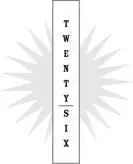
Klingon is the solution to an artistic problem, not a linguistic one. Okrand set out to create a believable language for a fictional culture, a language about which fans could say, “If Klingons existed, there is no question that this is what they would speak,” a language with the mysterious quality of having just the right feel.
And that urge, to create a language that captures an artistic vision, is the motivation for a new generation of language inventors. Their languages are designed for creativity’s sake, not to shape thought or change the world, or even to be spoken by anyone, but to satisfy the urge that J. R. R. Tolkien called his “secret vice.” For his Lord of the Rings trilogy, Tolkien crafted an entire family of languages, along with a realistic and extremely detailed explanation of the “historical” derivation processes through which the languages were related. Actually, it is more accurate to say that he crafted The Lord of the Rings for his languages. By the time the books were published in the mid-1950s, he had been working on his languages for over forty years. The creation of these languages consumed him almost against his will. At twenty-four years old he wrote of his obsession, “I often long to work at it and don’t let myself 'cause though I love it so it does seem such a mad hobby!” He later claimed that he wrote The Lord of the Rings to legitimize his madness: “Nobody believes me when I say that my long book is an attempt to create a world in which a form of language agreeable to my personal aesthetic might seem real. But it is true.”
As a boy, Tolkien had become enchanted with the Welsh words he saw printed on the freight cars that stopped at the train station behind his home. He loved the way the words looked and later, when he began to study the language, found he loved their sound even more. He explained his feeling for Welsh in the following way: “Most English-speaking people, for instance, will admit that cellar door is ‘beautiful,’ especially if dissociated from its sense (and its spelling). More beautiful than, say, sky , and far more beautiful than beautiful . Well then, in Welsh for me cellar doors are extraordinarily frequent.”
When he discovered Finnish as a student at Oxford, he said, “It was like discovering a wine-cellar filled with bottles of amazing wine of a kind and flavour never tasted before. It quite intoxicated me.” He began to construct his own language around the aspects of Finnish that inspired him, and as he worked on it, he began to develop a history and mythology for the language as well. His method of language construction was less a process of premeditated invention than a discovery. He would try out sounds and words until they seemed “right,” and to know what was right, he felt the need to know something about the hypothetical people who spoke the language. His Finnish-inspired language would later evolve into Quenya, one of the languages of the Elves in The Lord of the Rings . Part of his construction of the history for the language involved the back-engineering of an ancestor language from which it could realistically have been derived. That ancestor language became “Primitive Quendian,” from which a “contemporary” of Quenya, the Welsh-inspired Sindarin, spoken by a different community of Elves, was also derived. On the way to Sindarin (or rather the various dialects of Sindarin), Tolkien worked out aspects of Old Sindarin, Middle Sindarin, and a variety of other stages in the life of the language.
Plenty of other authors throughout history have provided fictional languages for their imagined lands. The citizens in Sir Thomas More’s Utopia (1516) have a Utopian language that looks very much like Latin. The inhabitants of the moon in Francis Godwin’s Man in the Moone (1638) speak a musical language. The people in Terre australe connue (1676) by Gabriel de Foigny speak a philosophical language like that designed by Wilkins and his contemporaries. From the strange cries of Swift’s Lilliputians in Gulliver’s Travels to Orwell’s Newspeak to the street slang of Burgess’s ruffians in A Clockwork Orange to the x - and z -filled jabber of countless works of science fiction, language creation has always been practiced for artistic purposes. However, these creations usually aren’t languages so much as they are ideas, a bit of vocabulary, a few phrases. They don’t invite further examination. They serve the story, never the other way around.
Читать дальше
